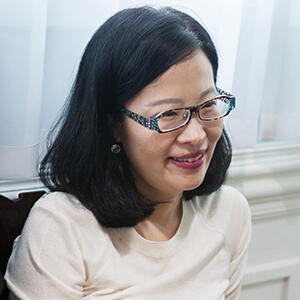APEC Summit Dominated by U.S.-China Relations, Policy Challenges
The 21 member economies of the Asia-Pacific Economic Cooperation (APEC) forum met in San Francisco from November 11-17 at the APEC Leaders’ Week to discuss trade, sustainable development, technological innovation, and other pressing issues. The occasion also provided opportunities for APEC member leaders to hold bilateral meetings, of which perhaps the most highly anticipated was a summit between U.S. President Joe Biden and Chinese President Xi Jinping.
Shorenstein APARC experts explain the implications of the APEC convening, analyze the deliverables from the Biden-Xi meeting, and examine issues that cast a shadow on the U.S. relations with Indonesia, Southeast Asia’s largest economy and the world's fourth-most populous country. Continue reading below for a roundup of our experts’ analysis and commentary featured in U.S. and international media.
APARC hosts Prime Minister Kishida and President Yoon
Autumn Quarter Seminar Series on APEC
Sign up for APARC newsletters to receive our experts' analysis >
Meeting face-to-face for the first time in a year on the sidelines of the APEC Summit, Biden and Xi discussed issues spanning military and trade relations, signaling a willingness to bring a degree of stability to the rocky U.S.-China bilateral relations. Ties between the two countries have deteriorated amid tensions like those in the South China Sea and the Taiwan Strait, disputes about technology competition, and the February 2023 Chinese spy balloon incident. APARC fellows consider the significance of the Biden-Xi meeting in numerous articles and interviews in the press.
The United States and China each have reasons to meet now and reduce hostilities. For President Biden, the upcoming 2024 presidential election is ample impetus to work for a better relationship with the Chinese. For Beijing, as Center Fellow Thomas Fingar tells the Japan Times, the country’s “economic difficulties and their implications for social stability and regime legitimacy have made Beijing more eager to improve relations with countries important to its economy than was the case six to 12 months ago.” And Center Fellow Oriana Skylar Mastro notes in the Christian Science Monitor that “both sides are trying to present to the rest of the world that they have things under control,” something that requires “predictable, high-level engagement.”
Most analysts, however, held low expectations for substantive outcomes from the meeting between the two leaders. According to Mastro, there is no indication of improvement in the tension between the two sides because neither the United States nor China is ready to make “any significant concession,” she argues on NBC News.
One reason for that is an aversion to political risk. As Mastro tells KCRW’s Madeleine Brand on Press Play: “There’s no political appetite for [thinking outside the box]. Political leaders want to make sure any policy will 100% work before they're willing to embark on it. But in the world of geopolitics, it's really hard to know that before you try things and experiment and assess and reassess.”
That said, just the very fact of the meeting taking place could represent an essential signal to Chinese officials, as Fingar points out to NBC News: “For there really to be a movement for lower levels of the [Chinese] system to engage in specifics, it needs a refreshed endorsement from Xi.”
One outcome many were looking for was a resumption of U.S.-China military communications, what defense analysts call “mil-to-mil exchanges.” The Chinese severed these in 2022 when then-House Speaker Nancy Pelosi visited Taiwan. With close encounters between American and Chinese forces in the Taiwan Strait and South China Sea becoming almost commonplace, communications at the military senior level are critical to prevent escalation. But restoring these ties would have limited value because, as Mastro tells NPR, “You can expect that, the next time [the Chinese] get unhappy about something, maybe after the Taiwan election, they cut them off again. So, unless we have some sort of commitment to sustained engagement, the mil-to-mil exchanges are unlikely to be sufficient to stabilize the relationship.”
The Biden-Xi meeting took place on the backdrop of the Israel-Hamas war in Gaza. The United States is concerned that China — as a good friend of Iran and one of the largest importers of its gas and oil — could complicate diplomatic efforts to end the conflict and potentially exacerbate tensions. However, Mastro argues that bringing up the Middle East in the context of the U.S.-China bilateral meeting only serves to aid Beijing in its propaganda efforts. As she says on KTVU Fox 2 News, “China does not really care what happens [in the Middle East]. But they are leveraging the support, especially in the developing world, in the Global South, for Hamas to push back against the United States and basically use Israel as a proxy for discontent about what they call ‘American unilateralism,’ ‘American hegemony.’”
The conflict in the Middle East came up in another high-level meeting when Indonesian President Joko Widodo visited Biden in Washinton before heading to the APEC forum. Although U.S.-Indonesian security cooperation is good and trade has grown, Jakarta is unhappy with the White House for several reasons. Among these, the war in Gaza was probably foremost in Widodo’s mind, writes Ambassador Scot Marciel, the Oksenberg-Rholen Fellow at APARC, in an essay for The Diplomat magazine. “Indonesia, home to the world’s largest Muslim population, has long supported the Palestinian cause and has vigorously pursued diplomatic efforts to achieve an immediate ceasefire.” Thus, Indonesian public opinion has put Jakarta and Washington at odds over the Israel-Hamas crisis, explains Marciel.
Indonesians also remain upset by the snub of Biden skipping the recent East Asia Summit and by “what they see as Washington’s failure to deliver on the high-profile Just Energy Transition Partnership, under which the U.S. committed to lead G-7-plus efforts to mobilize $20 billion to support Indonesia’s accelerated transition from coal to cleaner energy,” Marciel writes, urging Washington to engage Jakarta seriously on these issues before Indonesia is heading into crucial presidential elections in early 2024.
More Media Coverage
For more coverage of the APEC forum and Biden-Xi meeting with analysis by APARC scholars, visit the links below:
Kishida and Xi Aim for Trade Progress Despite Lingering Tensions
The Japan Times, November 17, 2023
Biden, Xi Set to Pledge Ban on AI in Autonomous Weapons Like Drones, Nuclear Warhead Control
South China Morning Post, November 17, 2023
Oriana Skylar Mastro on the Xi-Biden Meeting on the Sidelines of APEC
BBC Sounds, November 15, 2023
Biden, Xi Eye Economic, Military Thaw in High-Stakes Meeting
Bloomberg Technology, November 15, 2023
US Grants Chinese Journalists Hundreds of Visas to Cover APEC
Bloomberg News, November 14, 2023
Xi’s Arrival in US Brings Protesters and Fans Onto Streets
Bloomberg News, November 14, 2023
U.S.-China: One Summit, Two Different Goals for Biden and Xi
Nikkei Asia, November 14, 2023
Presidents Xi and Biden Seek to Turn Back the Clock in San Francisco
Time Magazine, November 14, 2023
China's Xi Jinping to meet with Biden in San Francisco
NPR, November 11, 2023
Biden, Xi Set to Pledge Ban on AI in Autonomous Weapons Like Drones, Nuclear Warhead Control
South China Morning Post, November 11, 2023
Biden and Xi to Seek to Stabilize Relations in California Meeting
New York Times, November 10, 2023
APEC Offers Important Chance to Stabilize Tense U.S.-China Relations
San Francisco Examiner, November 10, 2023
Joe Biden, Xi Jinping Set to Steal APEC Spotlight with Talks to Steady Ties
Reuters, November 8, 2023
Read More

The Asia-Pacific Economic Cooperation summit in San Francisco, which concluded the 2023 APEC host year for the United States, included a highly-anticipated meeting between U.S. President Joe Biden and Chinese President Xi Jinping. Shorenstein APARC scholars weigh in on the significance of the meeting in the context of China’s geopolitical ambitions, the outcomes of the APEC summit, and other topics.

 FSI scholars approach their research on the environment from regulatory, economic and societal angles. The Center on Food Security and the Environment weighs the connection between climate change and agriculture; the impact of biofuel expansion on land and food supply; how to increase crop yields without expanding agricultural lands; and the trends in aquaculture. FSE’s research spans the globe – from the potential of smallholder irrigation to reduce hunger and improve development in sub-Saharan Africa to the devastation of drought on Iowa farms.
FSI scholars approach their research on the environment from regulatory, economic and societal angles. The Center on Food Security and the Environment weighs the connection between climate change and agriculture; the impact of biofuel expansion on land and food supply; how to increase crop yields without expanding agricultural lands; and the trends in aquaculture. FSE’s research spans the globe – from the potential of smallholder irrigation to reduce hunger and improve development in sub-Saharan Africa to the devastation of drought on Iowa farms. 












